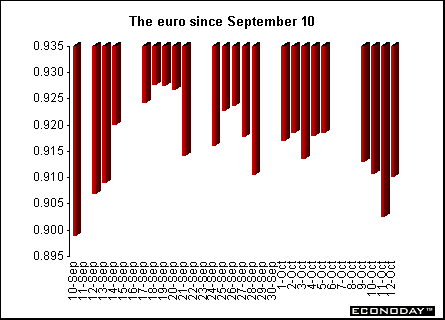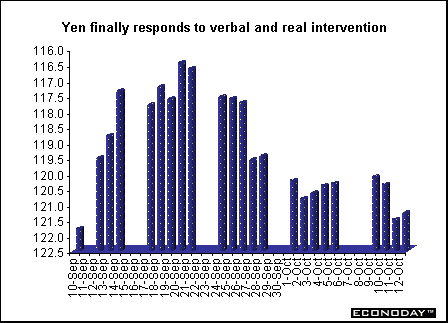
Currencies
The euro continues to give back the gains it achieved after the September 11 terrorist attack. It fell against the dollar after the beginning of the U.S. air attacks last Sunday, and it was pushed even lower by expectations the European Central Bank would keep its key borrowing rate at 3.75 percent. Analysts continue to be concerned that the ECB isn't doing enough to foster growth. However, the euro rose on Friday on the anthrax and terrorist attack fears. The euro continues to be affected more by U.S. events than those in Europe. Analysts, while not as certain as they were in early September, still think the U.S. economy is a better bet because of the variety of tools available for stimulus in contrast to Europe's structural rigidities.

The yen continued to be talked down by government officials. The last thing the Japanese economy needs is a strong yen, which would cut into exports while boosting imports. A more expensive yen means that exports will cost more in the United States and elsewhere while a weaker yen boosts exports because of cheaper prices. A cheaper yen also helps boost exporters' profits when they are repatriated.

The Bank of Japan has withdrawn much of the extra money that it pumped into the Japanese economy in the wake of the September 11 terrorist attacks, casting further doubts over the country's dismal growth outlook. In the past week and a half, the BoJ has drained most of the cash it had added to shore up confidence in the wake of the terror attacks and ahead of Japan's September 30 closing of corporate books. The central bank had injected much of that cash via currency market interventions, in a successful effort to prevent the yen from soaring in value against the dollar as the U.S. braced for war. The bank bought an unprecedented $30 billion of foreign currency during those interventions, according to estimates. The monetary contraction also disappoints the legion of Bank of Japan critics who have been calling on the bank to aggressively pump up the money supply to halt the price deflation that's eroding the country's asset values and corporate profits.
 |


Introduction • Global Stock Market Indexes • Recap of Global Markets • Currencies • Indicator Scoreboard

The Bottom Line • Looking Ahead
|